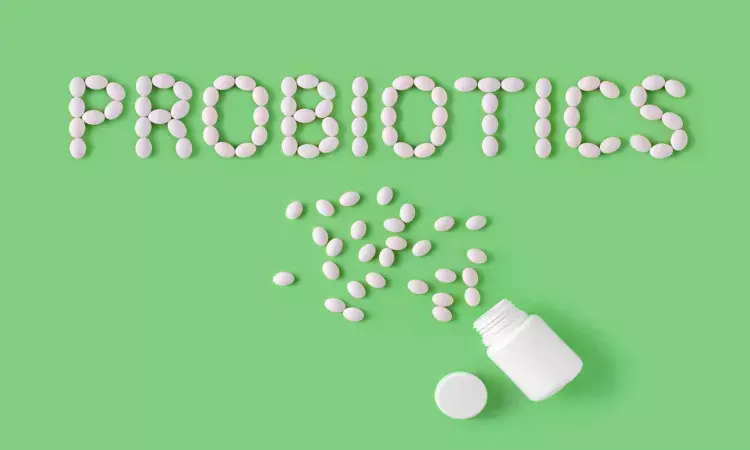- Home
- Medical news & Guidelines
- Anesthesiology
- Cardiology and CTVS
- Critical Care
- Dentistry
- Dermatology
- Diabetes and Endocrinology
- ENT
- Gastroenterology
- Medicine
- Nephrology
- Neurology
- Obstretics-Gynaecology
- Oncology
- Ophthalmology
- Orthopaedics
- Pediatrics-Neonatology
- Psychiatry
- Pulmonology
- Radiology
- Surgery
- Urology
- Laboratory Medicine
- Diet
- Nursing
- Paramedical
- Physiotherapy
- Health news
- Fact Check
- Bone Health Fact Check
- Brain Health Fact Check
- Cancer Related Fact Check
- Child Care Fact Check
- Dental and oral health fact check
- Diabetes and metabolic health fact check
- Diet and Nutrition Fact Check
- Eye and ENT Care Fact Check
- Fitness fact check
- Gut health fact check
- Heart health fact check
- Kidney health fact check
- Medical education fact check
- Men's health fact check
- Respiratory fact check
- Skin and hair care fact check
- Vaccine and Immunization fact check
- Women's health fact check
- AYUSH
- State News
- Andaman and Nicobar Islands
- Andhra Pradesh
- Arunachal Pradesh
- Assam
- Bihar
- Chandigarh
- Chattisgarh
- Dadra and Nagar Haveli
- Daman and Diu
- Delhi
- Goa
- Gujarat
- Haryana
- Himachal Pradesh
- Jammu & Kashmir
- Jharkhand
- Karnataka
- Kerala
- Ladakh
- Lakshadweep
- Madhya Pradesh
- Maharashtra
- Manipur
- Meghalaya
- Mizoram
- Nagaland
- Odisha
- Puducherry
- Punjab
- Rajasthan
- Sikkim
- Tamil Nadu
- Telangana
- Tripura
- Uttar Pradesh
- Uttrakhand
- West Bengal
- Medical Education
- Industry
Probiotics supplementation complementary therapy for control of high BP

Iran: A recent study has claimed that probiotics could be used as a complementary therapy for managing high blood pressure (BP).
The umbrella meta-analysis published in Nutrition, Metabolism and Cardiovascular Diseases showed that probiotics supplementation improves blood pressure (systolic and diastolic).
Previous studies have shown hypertension (HTN) to be firmly and directly associated with the risk of chronic disease, stroke, myocardial infarction, kidney diseases, and type 2 diabetes. In the last thirty years, HTN prevalence has doubled to 1.28 billion. Treatment with antihypertensive can have side effects, and often treatment adherence is reduced following long-term use. In this light, developing novel therapeutic methods such as gut microbiota modulatory agents is critical. Diet can impact the gut microbiota, but it appears to be temporary. It is not known if prolonged changes in diet induce permanent changes in the gut microbiota, primarily due to a lack of long-term studies on the human diet.
Recent studies have shown that probiotics could lower blood pressure, but the findings need to be more consistent. Therefore, Meysam Zarezadeh from Tabriz University of Medical Sciences in Tabriz, Iran, and colleagues carried out an umbrella meta-analysis to provide a more accurate estimate of the overall impacts of probiotics supplementation on blood pressure.
The team searched the international databases till November 2021 to evaluate the effects of probiotics on BP. Sensitivity analysis was performed using the leave-one-out method. GRADE (Grading of Recommendations Assessment, Development, and Evaluation) was used to assess the evidence's certainty.
The study revealed the following findings:
- The pooled effect size of 14 meta-analyses with 15,494 participants showed significant decreases in both systolic (Weighted mean difference (WMD) = −1.96 mmHg, and standardized mean difference (SMD) = −2.62) and diastolic BP (WMD = −1.28 mmHg, and SMD = −0.60 mmHg) following probiotics supplementation.
- More significant effects on SBP were revealed in trials with a mean age of >50 years and a duration of intervention of ≤10 weeks.
- Diastolic BP was also reduced in studies with a dosage of ≥1010 colony forming unit (CFU), and systolic BP was decreased in patients with hypertension or diabetes analyzing WMD.
"The findings confirmed the potential benefits of probiotics supplementation in managing hypertension," the researchers wrote. "They revealed that probiotics could be used for controlling high BP, particularly in patients diagnosed with type 2 diabetes or hypertension, elderly (>50 years), at doses ≥1010 CFU and with intervention duration ≤10 weeks."
Reference:
Zarezadeh M, Musazadeh V, Ghalichi F, Kavyani Z, Nasernia R, Parang M, Jamilian P, Jamilian P, Fakhr L, Ostadrahimi A, Mekary RA. Effects of probiotics supplementation on blood pressure: An umbrella meta-analysis of randomized controlled trials. Nutr Metab Cardiovasc Dis. 2023 Feb;33(2):275-286. doi: 10.1016/j.numecd.2022.09.005. Epub 2022 Oct 12. PMID: 36599781.
Dr Kamal Kant Kohli-MBBS, DTCD- a chest specialist with more than 30 years of practice and a flair for writing clinical articles, Dr Kamal Kant Kohli joined Medical Dialogues as a Chief Editor of Medical News. Besides writing articles, as an editor, he proofreads and verifies all the medical content published on Medical Dialogues including those coming from journals, studies,medical conferences,guidelines etc. Email: drkohli@medicaldialogues.in. Contact no. 011-43720751


